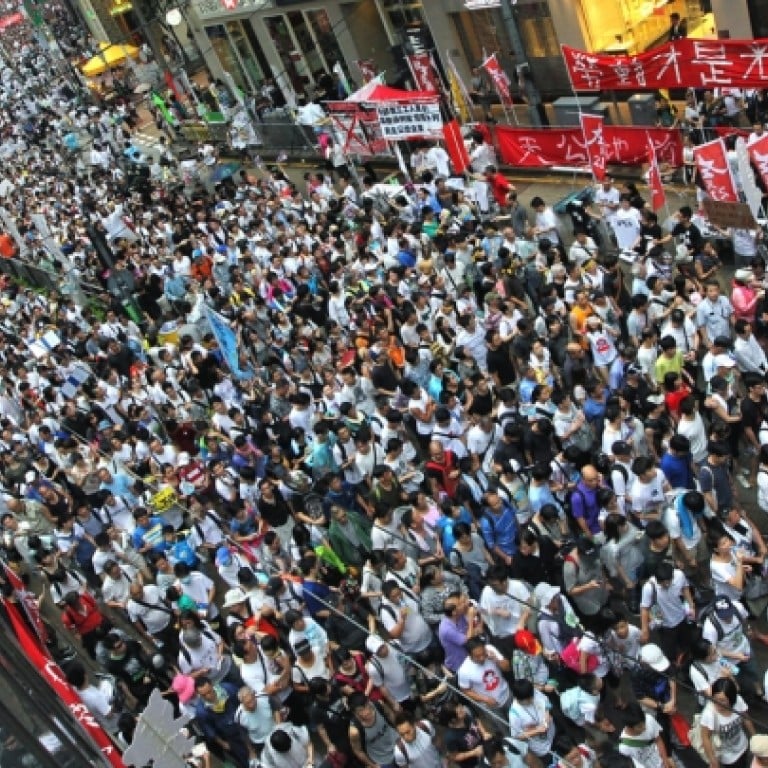
March sees storm clouds gather for CY Leung
As city marks the 16th anniversary of handover, protesters defy rain to demand full democracy and urge beleaguered chief executive to resign
Hundreds of thousands took to the streets yesterday, braving heavy rain to demand universal suffrage and the resignation of Chief Executive Leung Chun-ying a year after he took office.
The annual July 1 march was matched by a string of events to celebrate the 16th year of Chinese rule, making it one of the most polarised and divided handover anniversaries in the past decade.
An hour into the march, scuffles broke out between police and protesters near the Sogo department store in Causeway Bay.
With protesters making slow progress, some tried to cross into the eastbound lane of Hennessy Road, while others tried to join the march there rather than at Victoria Park. Protesters removed police barricades and officers led away several demonstrators before eventually opening a short eastbound section.
A member of the student group Scholarism, Ivan Tan Yi-chun, said police hoped to force people to leave the march by refusing to open up more lanes. "Fortunately, they failed. No one left, not even in the rain," he said. Organisers said 430,000 people took part, compared to 400,000 last year. Police said 35,500 left Victoria Park and 66,000 participated at its peak. Paul Yip Siu-fai, a statistician at the University of Hong Kong, estimated the turnout at 103,000 based on an on-site count. The University of Hong Kong's public opinion programme put the figure at 93,000.
Pro-government groups, meanwhile, said up to 225,000 people joined their events in all 18 districts. Police said 1,500 joined the two-hour celebration at Tamar Park at its peak.
About 18,000 youngsters also attended a concert that featured Korean pop stars at Kai Tak.
An hour before the 2.40pm start of the march, the Observatory hoisted the No.3 typhoon signal as Severe Tropical Storm Rumbia neared the city.
But the march - hailed by Beijing's top official in Hong Kong as evidence that the city's freedoms had been maintained - showed little sign of being affected. It took six hours for the tail to arrive at Chater Garden. Amid an array of demands - from gay rights to animal rights - most protesters shared common causes, waving flags that read "Occupy Central" and chanting slogans including "Down with C.Y.".
March organiser the Civil Human Rights Front held a rally at the finishing point until 9.20pm in a gesture of support for the Occupy Central plan, scheduled for July next year as a last push for democracy.
University of Hong Kong law academic Benny Tai Yiu-ting, who proposed the act of civil disobedience, said: "Today's challenge … is whether you are willing to go beyond yourself and pay [a price for democracy]." Pan-democratic lawmaker Lee Cheuk-yan said the anger and discontent directed at Leung was unprecedented. "We will not tolerate him for four more years," Lee said. "He has done nothing in democratic reform, and made a mess of livelihood issues."
The chief executive said the government would listen carefully to the various demands aired during the march. "We still have plenty of time to launch the consultation on the methods of the 2017 chief executive election and the constitutional procedures will be initiated at an appropriate juncture," he said.
Ahead of the march, central government liaison office director Zhang Xiaoming said what the city needed was "peace, rationality and positive energy". He said: "[The fact] so many people take to the streets illustrates that Hong Kong enjoys sufficient rights and freedom under 'one country, two systems'."
Executive Council convenor Lam Woon-kwong said the marchers' calls for the early introduction of universal suffrage and their show of discontent were "facts" that must be addressed.
Lam said universal suffrage would break the deadlock between the executive and the legislature which angered the public and made it difficult for the administration to win support for policies to deal with problems that were urgent.


